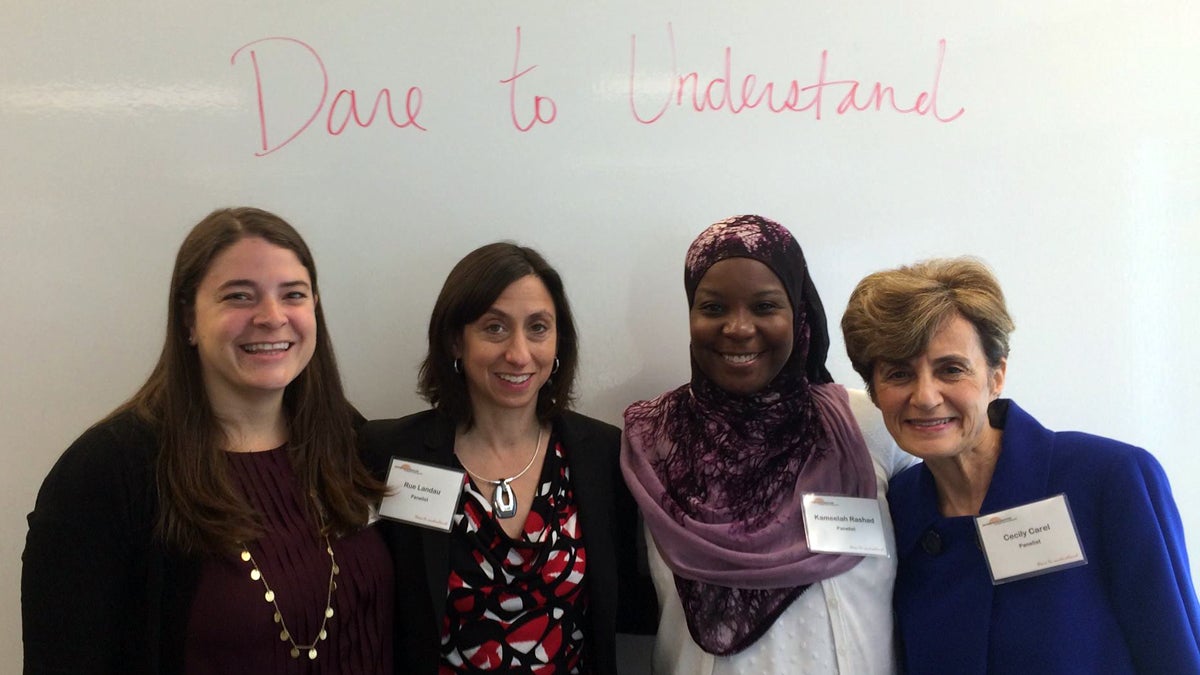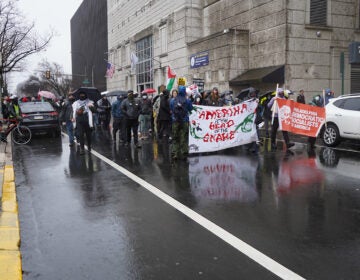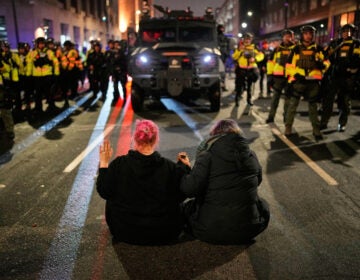The new age of HR, beyond accommodating religious practices

'Religious Diversity in the Workplace' panelists, from left: Nicole Diroff, Interfaith Center of Greater Philadelphia; Rue Landau, Philadelphia Commission on Human Relations and the Fair Housing Commission; Kameelah Rashad, Muslim WellnessFoundation; Cecily Carel, Jack M. Barrack Hebrew Academy. (Susan Richardson/for NewsWorks)
“Human Resources” — the term probably trips off your tongue, it’s such a natural part of our work worlds. I was at an event last week, “Beyond Accommodation: Religious Diversity in the Workplace,” that spoke to a new age of HR. Employees who are not able to bring their faith practices into their work lives risk leaving their fullest productivity (and sometimes their legal rights) at the door.
The event was co-sponsored by the Interfaith Center of Greater Philadelphia and PricewaterhouseCoopers in PwC’s new digs at 2001 Market Street. The current issue of Philadelphia Magazine gives a bird’s-eye view of how the new space taps trends in supporting employee comfort and productivity. But it still took me pleasantly by surprise to step off the elevator and into a bright, open room facing Philly’s horizons, with air hockey and pool tables, a well-stocked kitchen, and employees perched on bar stools and cozy chairs checking phones to get ready for the day.
Ok, I can do this…
The event, like the setting, was about being yourself at work. Only instead of the air hockey (which I’m seriously coveting as a perfect way to blow off steam after a staff meeting), it was about space for workers’ religious practices.
Whether or not you have religious habits of your own, the ability for workers to ask for accommodations of their practices — holy days, Sabbath observance, food, travel concerns, clothing, on-site prayer space — has become an increasingly visible part of workplaces across the spectrum of businesses and organizations. Along with factors such as race, sexuality, and disability, religion is a protected category, and employers are working out what that looks like in terms of both legality and productivity. Enter Human Resources.
Building the conversation with informed faith leaders in partnership with a top-shelf secular business such as PwC was an especially invigorating, progressive model.
“We value everyone’s unique perspective at PwC and recognize that we are all different, we are all diverse,” said Kimberly Tombasco, advisory talent manager at the firm, who had helped head up the event. “We also know that cultivating a diverse organization enables us to attract, retain, and develop diverse professionals that will spur innovation, drive growth, and sustain our competitive advantage in the market.
The Interfaith Center’s Nicole Diroff agrees. “The workplace has been an important setting for these conversations as we learn how allowing someone to bring their full self to work leads to increased talent retention and productivity,” she said.
The panel included Cecily Carel, president of the Jack M. Barrack Hebrew Academy board of directors; Suhag Shukla, cofounder of the Hindu American Foundation; and Kameelah Rashad, founder of the Muslim Wellness Foundation. Rue Landau, head of the Philadelphia Commission on Human Relations and the Fair Housing Commission, brought the legal perspective.
Panelists found immediately relevant ways to enter the questions of religious considerations in the workplace: core principles of their faith, times when their practices intersected with work that were either positive or challenging, and what HR professionals needed to know to be sensitive and pro-active with religious needs in their workplaces. Landau provided a good reality check on the legal angles and some of the on-the-ground examples of what’s going on in Philly.
At my own table, populated mainly by HR representatives from SEPTA and PwC, people described religious accommodation as a consistent part of their jobs, saying it was helpful and indeed a relief to be able to have intentional, open conversation about it.
To allow employees to bring their religious practices into their work lives raises new logistical questions, as do other protected categories. But as with these other factors in the workplace, the answers can unfold only through information, understanding and structured dialogue.
The invitation? To go ahead into that territory with open minds and informed support.
And an air hockey table never hurts.
WHYY is your source for fact-based, in-depth journalism and information. As a nonprofit organization, we rely on financial support from readers like you. Please give today.




